In today’s digitally interconnected world, cybercrime has become a significant threat. From phishing scams to ransomware attacks, criminals are leveraging technology to exploit vulnerabilities. As cyber threats evolve, awareness and adherence to the latest rules and regulations are essential to safeguard individuals, businesses, and governments.
Why Cybercrime Awareness is Crucial
1. Protecting Personal Information
Cybercriminals often target sensitive personal information, such as financial details, social security numbers, and login credentials. Awareness helps individuals identify potential threats like phishing emails or fake websites and avoid falling victim to these attacks.
2. Preventing Financial Loss
Cybercrime can lead to severe financial losses. From fraudulent transactions to ransomware demands, ignorance can result in monetary damages. Staying informed enables better preventive measures, such as using secure payment methods and monitoring financial accounts.
3. Safeguarding Businesses
For businesses, a single cyberattack can mean data breaches, reputation loss, and compliance penalties. Employees trained in cybersecurity awareness act as the first line of defense, recognizing threats and minimizing risks.
4. Staying Ahead of Cyber Threats
Cyber threats evolve rapidly. Regular awareness programs help individuals and organizations stay updated on new attack methods, enhancing their ability to adapt and defend against them.
Latest Cybercrime Rules and Regulations
Governments worldwide are introducing stringent laws to combat cybercrime and ensure digital safety. Here are some key regulations:
1. India: IT (Intermediary Guidelines and Digital Media Ethics Code) Rules, 2021
- Social media platforms must identify the "first originator" of malicious content.
- Companies must report cybersecurity incidents within a specified time frame.
- Protection of user privacy and implementation of grievance redressal mechanisms.
2. Europe: General Data Protection Regulation (GDPR)
- Strengthened data protection for EU citizens.
- Requires businesses to implement strict measures for data security.
- Penalties for non-compliance can reach up to 4% of global annual turnover.
3. United States: Cybersecurity Executive Order 2021
- Focus on improving software supply chain security.
- Mandatory breach notification to federal authorities.
- Encouragement for public-private partnerships to strengthen cybersecurity infrastructure.
4. Global Trends: Anti-Ransomware Initiatives
- Governments are introducing measures to counter ransomware attacks, including banning ransom payments and enhancing cyber resilience.
How to Stay Compliant and Safe
Educate Yourself and Your Team
- Attend cybersecurity webinars, workshops, and training programs.
- Regularly update your knowledge of evolving cyber threats.
Adopt Best Practices
- Use strong passwords and enable two-factor authentication.
- Regularly update your software and antivirus tools.
Comply with Legal Regulations
- Understand and implement rules applicable in your region or industry.
- Maintain transparency about data collection and storage.
Report Cybercrimes
- In India, report incidents to the Cyber Crime Reporting Portal (https://cybercrime.gov.in/).
- Global organizations can use local or international platforms for reporting, such as Interpol or FBI’s Internet Crime Complaint Center (IC3).
Conclusion
Awareness of cybercrime and compliance with the latest regulations is no longer optional—it’s a necessity. Whether you’re an individual or part of an organization, staying informed about threats and rules can prevent devastating consequences. By embracing a proactive approach to cybersecurity, we can collectively create a safer digital environment.
Stay vigilant, stay updated, and protect your digital presence!

Comments
Post a Comment